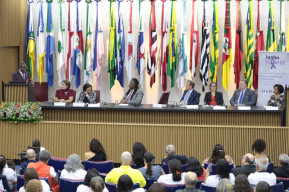News
Caribbean Regional Consultation for the Global Education Meeting 2020: Calls for more education partnerships

The COVID-19 pandemic offered an opportunity for better cooperation, coordination and collaboration among education stakeholders. But not enough - Caribbean education leaders express the need for more partnerships. In the lead up to UNESCO's Global Education Meeting, GEM 2020, on October 22, the Caribbean Small Island Developing States came together on September 24 for a regional consultation to reimagine and recommit to education in the new normal.
In preparation of the GEM 2020, UNESCO organized a series of regional consultations to ensure that the inputs of all Member States, partners and key stakeholders are reflected in the meeting’s outcome document (“The 2020 GEM Declaration”). The consultation of the Caribbean sub-region on the GEM 2020 outcome document was held on 24 September 2020 with state representatives from the English and Dutch Caribbean. The discussions of this regional consultation feed into the regional dialogue with the Latin American region, which will further contribute in form of a regional report to the 2020 GEM.
Caribbean Education officials highlighted the need for public-private partnerships for education, increased funding for the region's education sector, taking into account the differences among the Caribbean States and demanding more support for inclusive education and the most vulnerable during COVID-19 and beyond.
In her opening remarks, Saadia Sanchez, Director and Representative of the UNESCO Cluster Office for the Caribbean emphasized the importance of the meeting to rebuild education systems in the region. "Distance learning has been a challenge during the crisis, with many problems in remote areas, including little or no connectivity, lack of access to online educational assessment tools and the challenges for teachers to move from traditional classroom teaching to online environments."
Faryal Khan, UNESCO Programme Specialist for Education in the Caribbean, introduced the rules and roles of the virtual meeting to the attending representatives of the Caribbean Member States. She further highlighted the themes of the session to be discussed to be included in the GEM Outcome Document. These are the protection of domestic and international education financing of education; the safe reopening of schools; the focus on the most vulnerable and marginalized: equity and gender equality; reimagine teaching and learning and to harness equitable connectivity and technologies for learning.
The urgency and need of this extraordinary Global Education Meeting derive from the severe education disruption caused by the global COVID-19 crisis. Maki Katsuno-Hayashikawa, Director of the UNESCO Division for Education 2030 shed light on the objectives and background of why the extraordinary GEM2020 has been announced.

During the plenary discussion, government representatives from the Caribbean Small Island Developing States were invited to give their statement, presenting the current situation of education in their countries, their national efforts to rebuild education, the challenges and their feedback for inclusion in the GEM 2020 Outcome Document. Caribbean UNESCO Member States could submit their written statement until September 30 to be considered for the follow-up discussion within the regional consultation of Latin America.
Feedback from the Caribbean included that their national education systems have been stepping up in digital supply for teachers and students to facilitate e-learning. Those countries, that are planning to reopen their schools in October, had to re-distribute their classroom settings to enable physical distance. Lyneith Monteith, from the Cayman Islands Ministry of Education affirmed that they were partnering with the private sector to ensure that every child will be able to have access to a laptop for online classes. However, the pointed out that support for disadvantaged students needs to be increased. “We should not forget that all children were impacted by students, some more than others, we should focus on the disadvantaged with particular emphasis to leave no learner behind”.
Further government officials reiterated the need for public-private-partnership engagement to restore the education sector, also the need for inclusive education in times of crisis was repeatedly mentioned.
Dr. Laurette Bristol, Education Manager from CARICOM stressed the need to reflect the diverse settings and backgrounds in the different Caribbean States. The pandemic has affected the Caribbean SIDS in different severities, thus the COVID-19 responses and stages of preparation and resilience among the region vary, therefore a regional education response needs to bare these discrepancies in mind in order to benefit all.
Wrapping up the session, Mary Guinn Delaney, UNESCO Director of the Regional Education Office for Latin America and the Caribbean, OREALC highlighted the need to reflect the challenges of the new teaching role to caregivers and parents that they assume while being at home and educating the students.
Read 2020 GEM concept note and agenda
More about the 2020 GEM







